

Jump to winners | Jump to methodology
The legal industry's revenue is expected to decline by 1.1% in 2024 relative to the previous 12 months, part of wider trend of an 0.8% annualised rise over the period from 2019 to 2024. However, Australasian Lawyer's Fast Firms have outperformed the sector and these metrics by recording impressive increases in their revenues.
Sara Zahedi, Head of Professional Services at Macquarie Business Banking, highlights how key areas of growth according to her team’s research data are technology and cybersecurity, corporate revenue and environmental areas such as ESG, renewables and climate change and natural disasters.
She says, “We’ve noticed in many of our successful legal clients that areas of challenge in the past have been turned into opportunities to expand their firms’ knowledge, providing potential new areas for growth.”
Larger firms generate significantly higher revenue per full-time equivalent and per partner than smaller firms, suggesting their focus on investing in technology plays an important role in driving revenue growth.
“Larger firms use an average of 8.4 tools compared to smaller firms at 5.1,” says Zahedi. “They were more likely to invest in online client portals, CRM systems, collaboration tools and communication and workflow tools – all potential productivity boosters. AI is also set to accelerate, and its usage has already risen by 400% since 2017.”
Along with an increase in revenue, the other criteria to be named a Fast Firm was a rising headcount, both general and at the partner level – all for the calendar years 2022 and 2023.
AL’s team identified the firms that met these standards and, in turn, cemented their strong positions in the market.
Robert Kruger, legal senior manager at leading recruitment firm Robert Walters Australia, underlines how revenue and headcount are intertwined and explains how AL’s Fast Firms have achieved success in a challenging market.
“Staff retention is vital; by maintaining a stable team of experienced lawyers, firms can focus on serving clients effectively and streamlining the integration of new staff,” he says. “Proactive hiring is another critical aspect. Firms that anticipate demand and hire accordingly, rather than reacting to immediate needs, position themselves advantageously in the market. This forward-thinking approach enables firms to seize opportunities as they arise and expand strategically.”
And he adds, “By having a clear understanding of their strengths and tailoring their services accordingly, firms can expand their client base and drive revenue growth.”
The link between revenue and concept is also shared by Lisa Gazis, managing director at legal recruiter Mahlab. She explains how Fast Firms, which are growing, offer compelling value propositions to talented lawyers.
“These firms are generally recognised for their market-leading reputations and high-calibre work, for having a supportive and inclusive culture that values staff, is innovative, offers good promotional career development and training opportunities, has flexible work practices and recognises and compensates staff and partners fairly.”
Gazis also shares how onboarding partners with a growth mindset is also key for Fast Firms.
She says, “These law firms have also been able to satisfy incoming partners that they will have control over their practices, which is usually lacking in their current roles; for example, control over practice management, development, clients and decision-making. Law firms that have been able to differentiate themselves in these areas have continued to grow and attract quality people.”
Despite revenue only forecast to grow by an annualised 0.8% from 2019, to reach $30.4 billion by the end of 2024, the industry is creating jobs, as according to data from IBIS World, there are over 129,000 people working in legal firms across the country as of June 2024, a 4.5% increase since 2019.
Macquarie Business Banking’s 2024 Legal Benchmarking Report illustrates how AL’s Fast Firms are able to outperform the market, allowing them to benefit from economies of scale.
The legal industry has benefited from strong tailwinds over the past two years, demonstrating their value as trusted advisers to clients and playing a crucial role in business risk management strategy, which has helped optimise returns.
Macquarie Business Banking’s report found higher-performing firms:
generate considerably higher revenue per partner, indicating the effectiveness of leveraging and enhancing the expertise of their partners
spend a third less on salaries than their peers, while still generating higher revenues and profits
redeploy spend to investment in technology to streamline workflows, improving efficiency and reducing risk and errors
operate with two-thirds the headcount of their peers, maintaining a higher ratio of fee earning staff compared to support staff
Zahedi says, “With engaged teams, efficient processes, technology enablement and performance measures that are motivational, firms can succeed despite a leaner headcount. This needs to be balanced against long-term sustainability.”
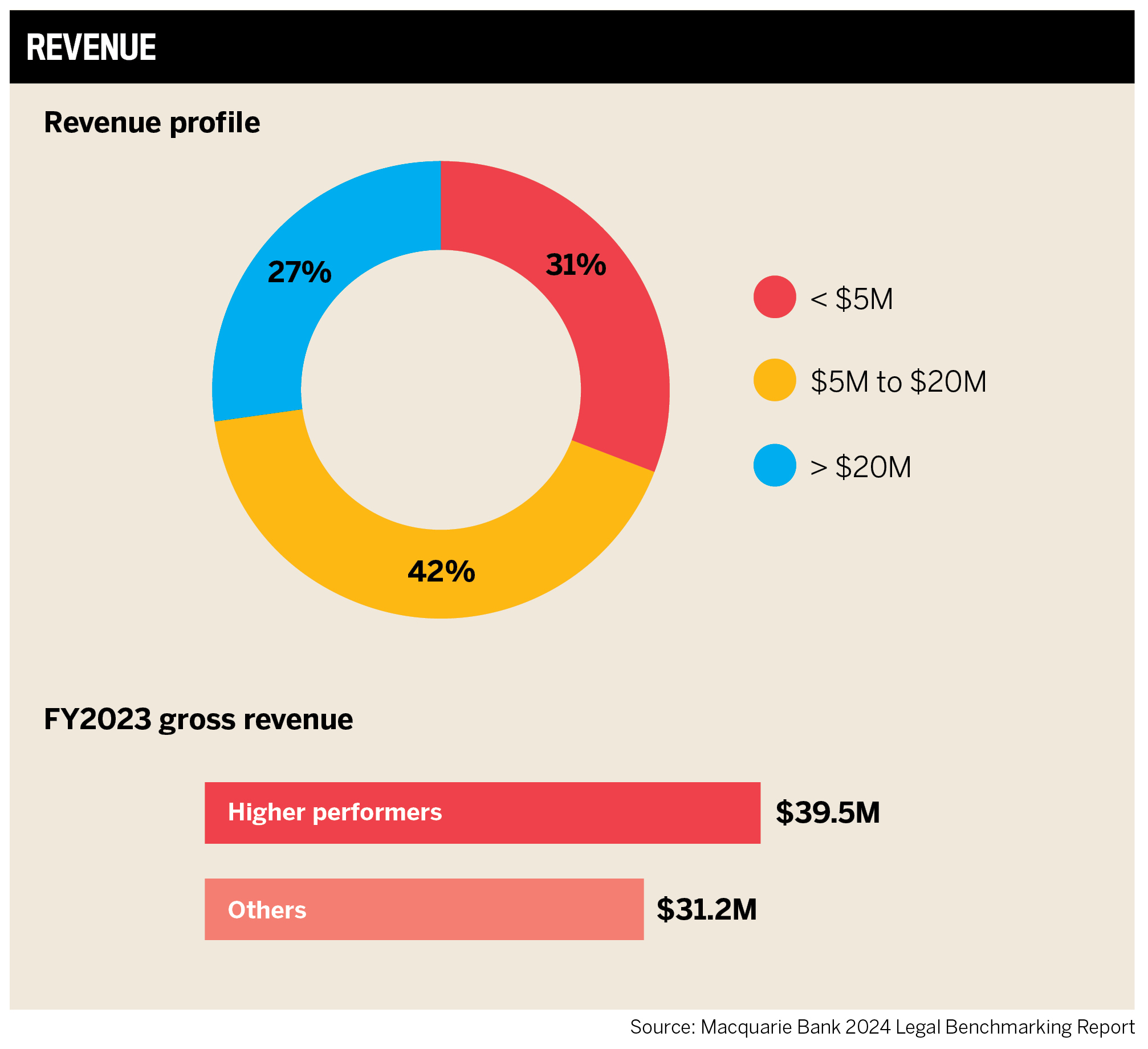
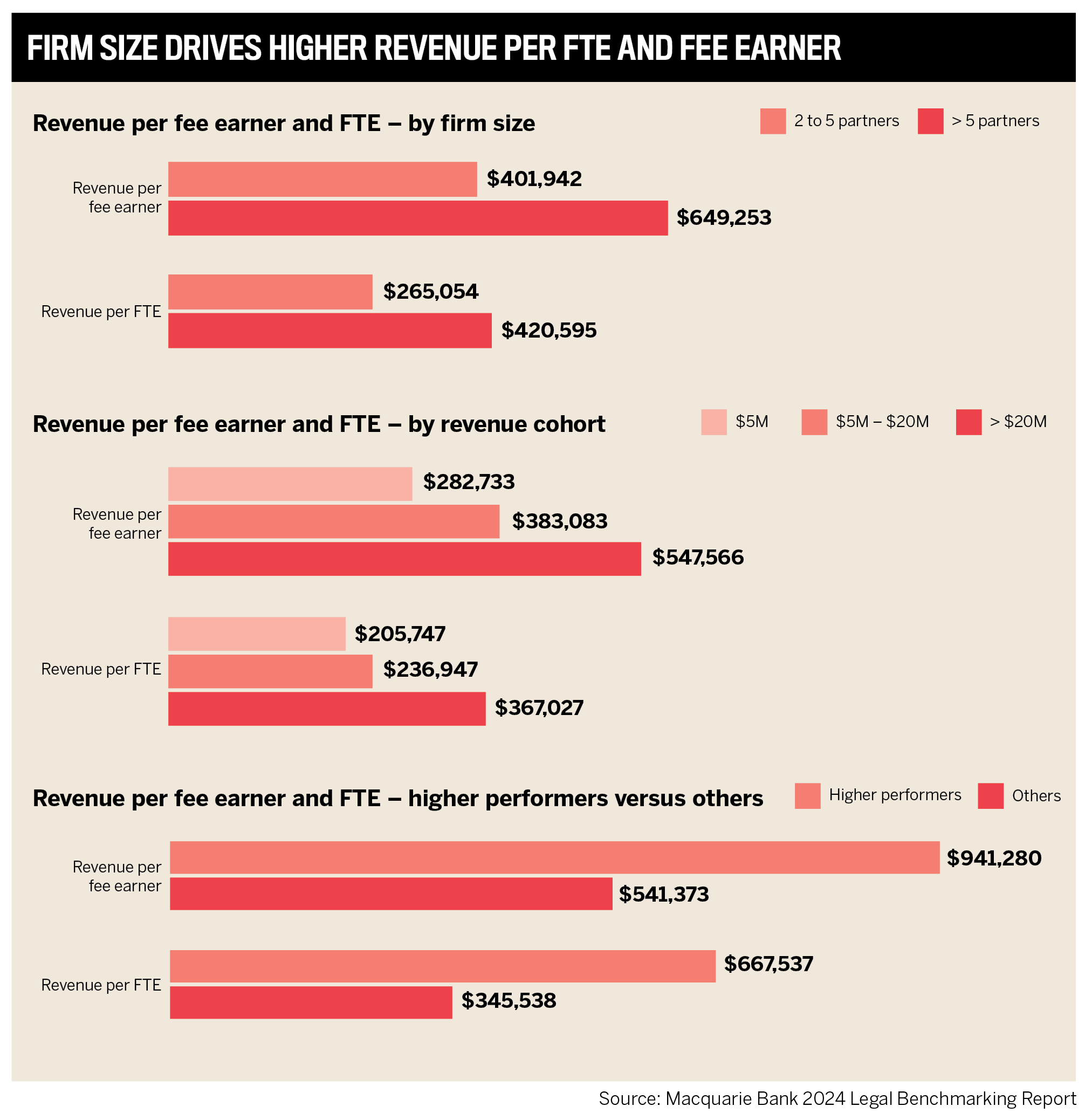
Macquarie Business Banking’s report also showcases how support staff are vital in helping firms grow.
Zahedi says, “Investing in technology is a critical strategy for enabling your support staff to do their most efficient work. You want to ensure their everyday tasks are as streamlined as possible so they can focus on value-adding work and feel engaged, productive and motivated.”
A total of 85% of the legal sector reportedly has difficulty attracting and retaining staff, which is why policies of ongoing training and upskilling are so important for firms to implement.
“It’s critical that firms focus on incentives, strategies and recognition beyond remuneration packages to retain and motivate staff,” says Zahedi. “These could include ensuring support staff have roles that are aligned to strategy and that they understand the value of their contribution, maintaining balance between professional and personal objectives and enabling clear career development pathways.”
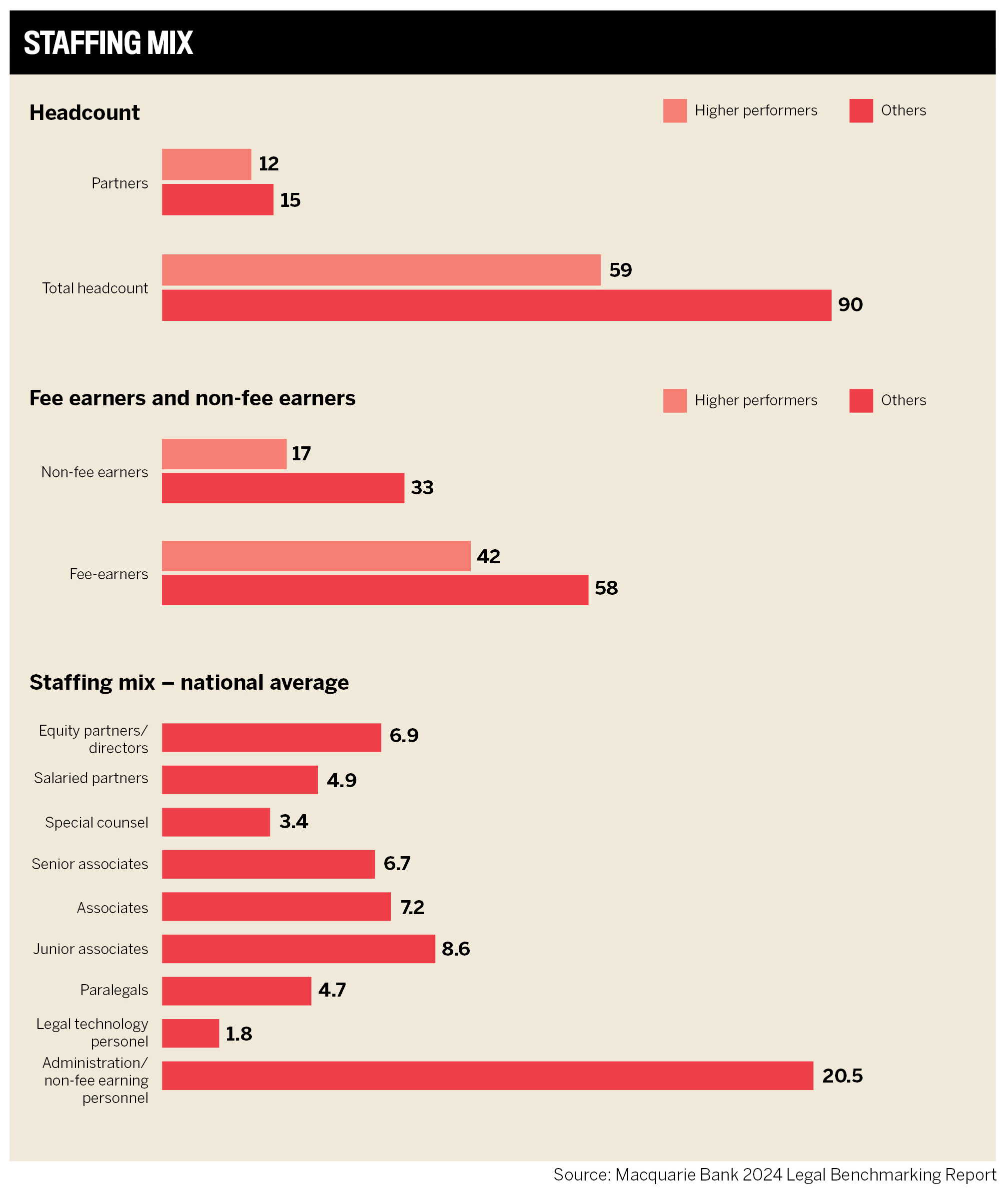
Kruger adds, “Successful firms have managed to grow their headcount by focusing on sustainable scaling rather than bulk hiring, which can damage firm culture. By prioritising quality over quantity, they ensure that each new hire fits seamlessly into their long-term vision. Moreover, firms with successful growth trajectories are known for their inclusive and positive recruitment processes.”
The fastest-growing law firms in Australia drove their success throughout the past 24 months via new strategies, changes to legislation or regulation and embracing technology.
Commercial law firm Piper Alderman has offices in Adelaide, Brisbane, Melbourne, Sydney and, most recently, Perth, with over 440 employees. The organisation has had remarkable success since 2021.
Across 2022 and 2023, the firm saw an increase in the following:
annual fee revenue by 14%
FTE staff numbers rose approximately 7.4% with the largest increases being at associate (28%) and senior associate (34%)
Piper Alderman’s growth stems from a variety of factors, including:
commercial/funded litigation
financial services – crypto and blockchain
real estate and projects


“Following an increase in regulation of financial services in Australia, there has been a big increase in demand over the last few years,” says managing partner Tony Britten-Jones. “Our real estate and our projects team has also grown significantly, and some of it has been organic with a balance of lateral hiring. We like to balance that growth with what I call ‘homegrown.’
“One of our core values is collaboration, and sometimes it’s hard to blend people into the firm if you’ve got too many people coming in at once. But we've had very good retention, and it’s working now.”
Over the past 18 months, Maddocks has seen double digit percentage growth in revenue. This is in addition to the rise in partner headcount of 2.2% and the number of fee earners by 3.6%.
In 2022, Maddocks undertook a firm-wide strategic review driven by leadership and various teams across their practice areas. The outcome has put them on a new growth trajectory, with:
a renewed business strategy and vision
increased emphasis on key sectors
stronger focus on planning
embracing the latest technologies, such as AI


“We refreshed our firm vision to be the Modern Australian Law Firm and are really focusing on engaging with our people and our clients to deliver on this,” adds COO Catherine Saliba. “Innovation and adoption of new technology have played an important part in our strategy and vision.
“We were the first Australian law firm to adopt a password-less login process as part of our cyber security measures and to adopt CoCounsel, an AI legal assistant from Thomson Reuters.”
Through its renewed strategy, there are now over 700 employees at Maddocks, a new high for the firm.
Since being established in Sydney 18 years ago, Rafton Family Lawyers has enjoyed extensive growth year on year, as it now operates seven offices.
Across 2022 and 2023, the firm saw growth in revenue of 53% and in fee earning staff of 37.5%, and that can be credited to launching two new specialised services:
Arbitration and Mediation Practice: three full-time team members who help clients settle disputes out of court, which is in line with changes to legislation
Wills and Estates: helping with updating wills and estate plans and providing expert assistance and advice to those excluded from a will or appointed as the administrator of an estate


“Revenue has grown exponentially, and we’ve added more team members, so everything’s on an upward trajectory significantly the last 18 months,” says managing partner and CEO Kate Rafton. “With family law matters in Australia, the legislation has been amended in the last five years, and if there’s a parenting dispute, it now provides that it’s mandatory to attend alternative dispute resolution before going to court, but obviously there are exceptions.
“Our team is made up of specialist family lawyers and mediators, and that’s why it’s been such a popular service. It’s cost-effective and quick.”
According to IBIS World figures, there were over 21,400 legal firms in Australia as of June 2024.
“For both boutique and global firms, maintaining a stable culture while growing is essential,” says Kruger. “Additionally, they need to build strong brand awareness, highlighting the calibre of their lawyers and the quality of matters they handle. This differentiation helps them attract prestigious clients and talented professionals.
“On the other hand, global firms must demonstrate a genuine focus on the Australian market, avoiding the perception of being merely international satellite offices. Emphasising commitment to local needs builds trust and credibility, supporting growth and integration within the region.”
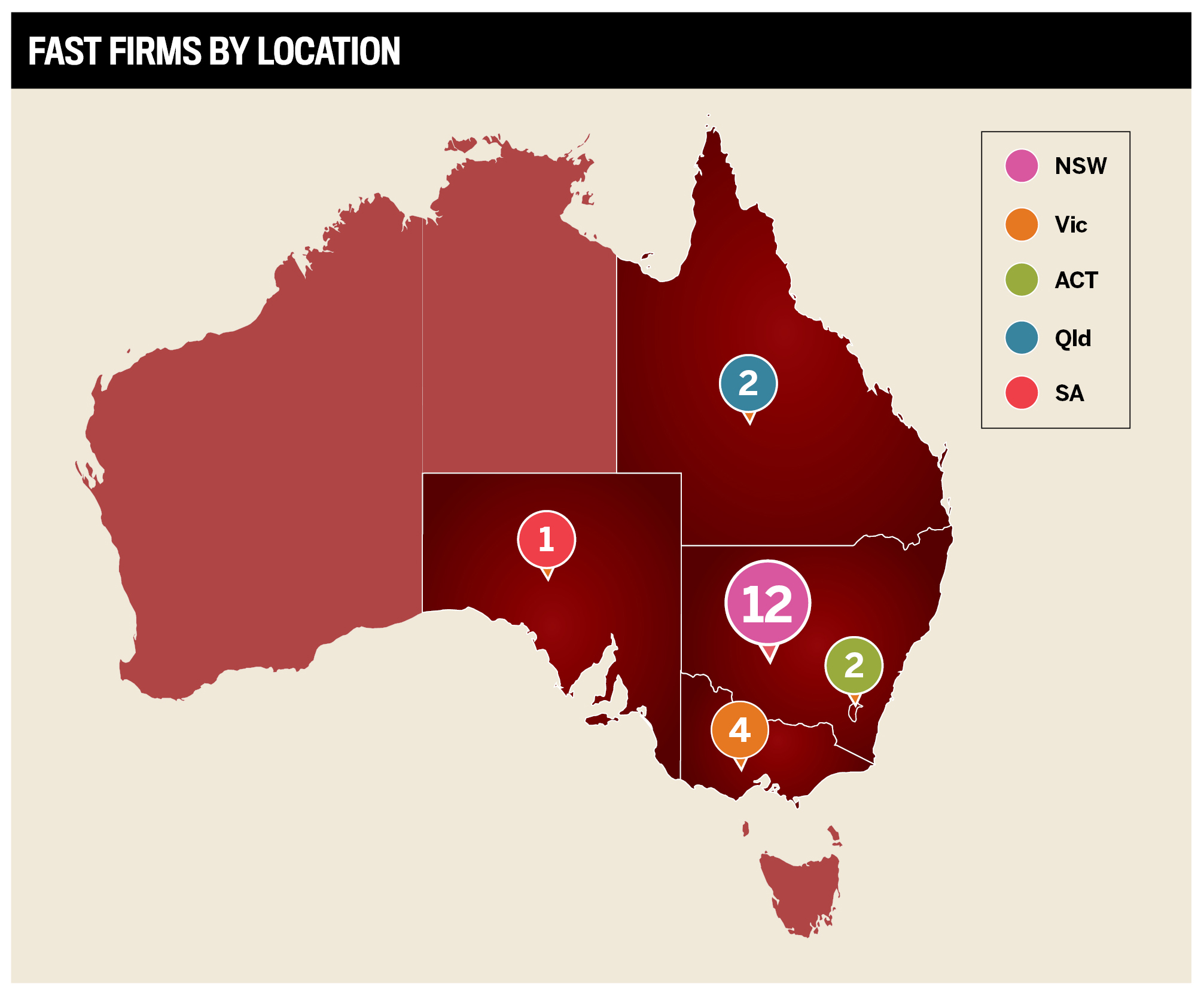
For Piper Alderman, it is about consolidation while revolutionising its offerings.
“There’s been a healthy demand for the areas of law in which we practice; we’ve very much focused on our strengths,” says Britten-Jones. “Most of our partners and lawyers try very hard to develop ongoing relationships with their clients. We want to be there for the client along the journey, and occasionally that will involve some litigation, but normally, we do the litigation in the context of knowing the client well prior.”
The firm aims to continually reinvigorate through alternative practices.
Britten-Jones says, “In the last 12 months, we organised a lawyer exchange arrangement with a London-based firm, Mishcon de Reya. We’ve had a couple of their lawyers work with us and exchange one of our lawyers with them; the reports have been very positive. It also helps you attract and retain talent. Our firm has had a successful last few years, increasing our profile, and we seem to have had a lot of new opportunities come to us over the past few months.”
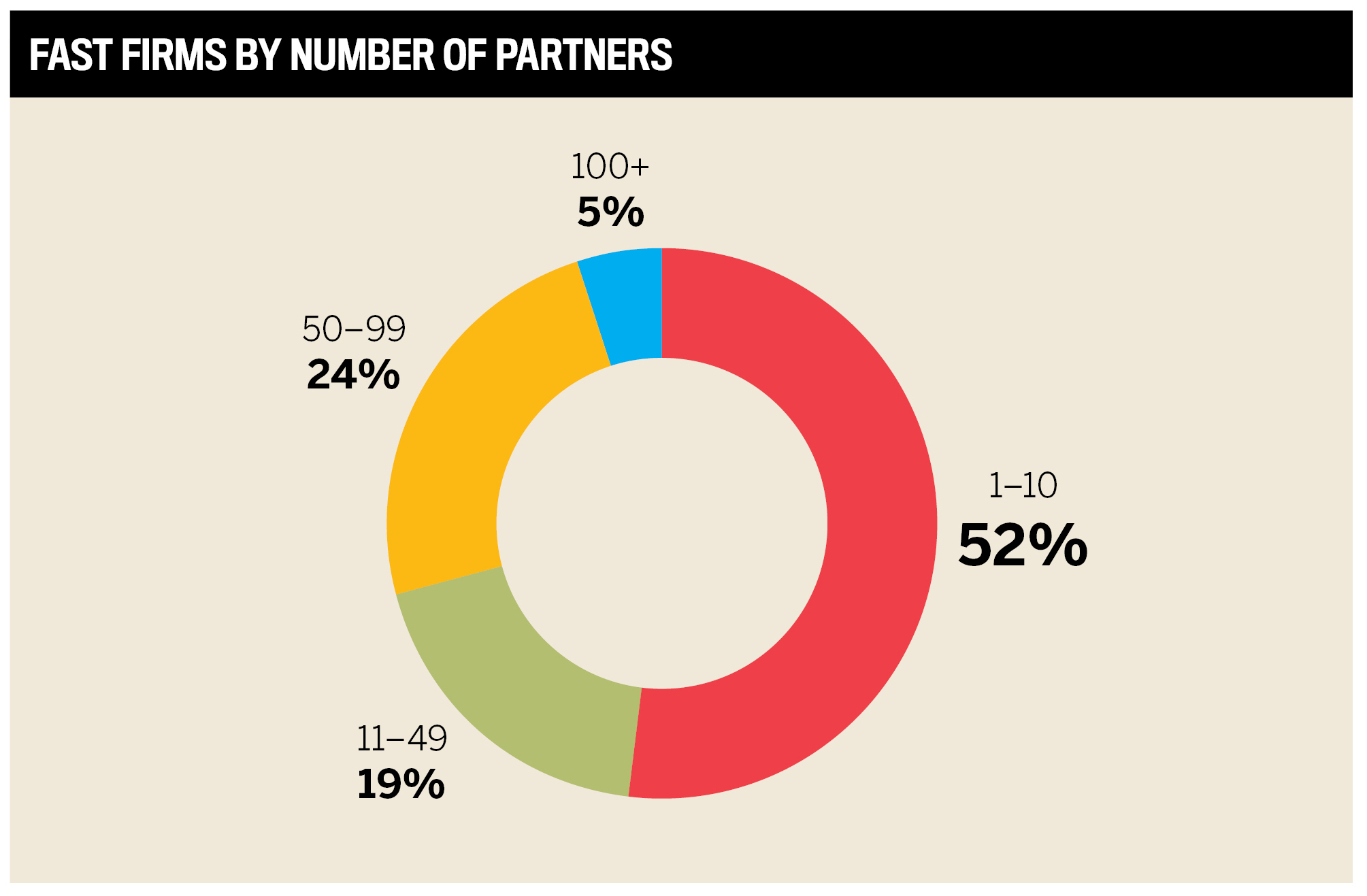
Refreshing its vision helps Maddocks stay at the forefront of Australian law.
“We continue to invest in our dedicated legal operations function that works directly with clients to tailor the delivery of our legal services to their needs,” says Saliba. “We also ran campaigns focusing on emerging legal issues such as AI, climate change and digital transformation that saw us win significant client work. This includes leading the Commonwealth Government’s investment in technology procurement across all departments as part of its digital transformation plans.”
It is important for Rafton Family Lawyers to constantly revitalise through the latest technology advancements and expand its footprint.
“Prior to COVID-19, we went completely paperless in our offices, and we have streamlined all our products,” says Rafton. “We are part of a group for LEAP Legal Software, testing all their latest technology, so it is very important to us and helps us offer good service to our clients. We use their AI tools for record management and finding information. In a property matter, we may be forensically looking at 15 bank statements; with AI, we can enter the data we need, and it will find it in three minutes, rather than us taking 30 minutes to find that particular transaction.”
The firm opened a new office, which could open a new world of opportunity.
“There is a new airport opening in southwest Sydney in 2026, and it is the fastest-growing postcode in Australia. So, we’ve launched our new office in that geographical area, which has huge growth potential when it opens. That's a big focus now,” says Rafton.

Australasian Lawyer launched the nominations period for the 2024 Fast Firms report on 20 May in line with the publication’s goal to recognise the fastest-growing law firms in Australia.
The research team asked firms to list their revenue and headcount figures for the 2022 and 2023 calendar years, in addition to other growth milestones they wanted to highlight. Global firms were instructed to focus only on the figures related to their Australian operations.
The Australasian Lawyer team then evaluated the nominations received to identify the firms that experienced standout growth in terms of revenue, partnership headcount, general headcount and progress in expansion.
A total of 21 firms made the final list, including small boutiques and big global firms. These firms confirmed their resilience and cemented their strong positions in the Australian legal market.